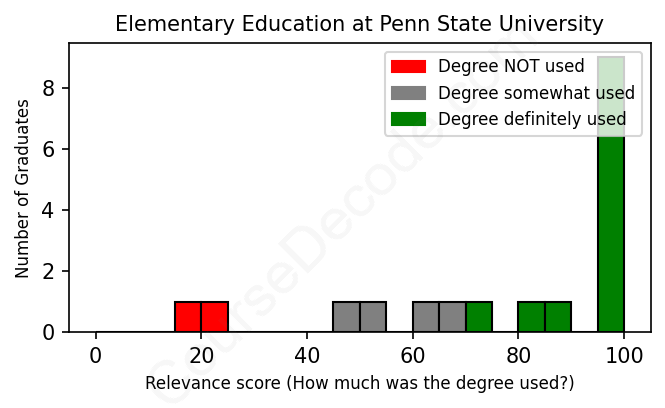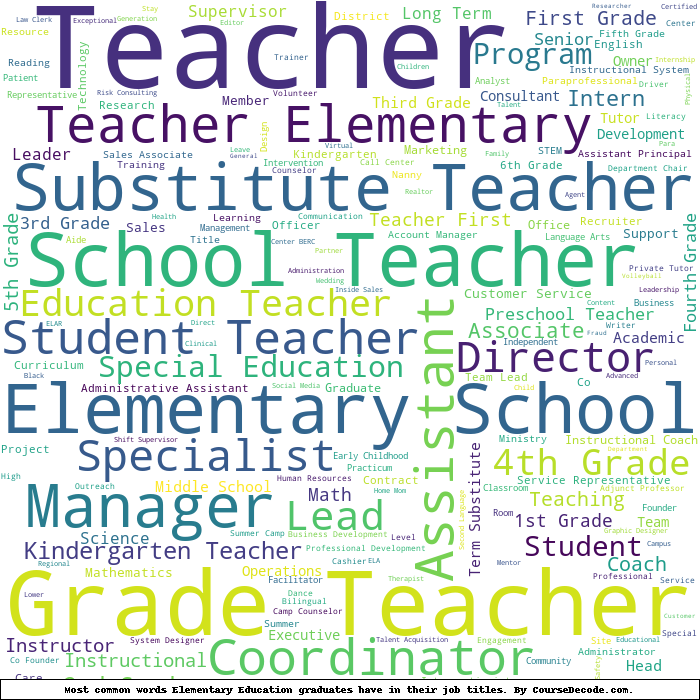
First, some facts. Of the Elementary Education graduates from Penn State University we've analyzed , here's how many have used (or NOT used) their degree in their career:

These are estimates based on AI analysis of 18 LinkedIn profiles (see below).
The verdict? Significantly above average. Overall, with an average relevance score of 78%, Elementary Education graduates from Penn State University have a much higher likelihood (+11%) of finding work in this field compared to the average graduate across all fields:
And for comparison, here's the chart for all profiles we've looked at across all degrees.
Also, after graduating, only 33% of these graduates have pursued further education other than another Bachelor's degree (such as a Masters degree or other), compared to the average across all profiles of 35%. This suggests a Bachelors degree is enough for most Elementary Education graduates, and it's normal to look for work straight after graduation.
See the details:
|
Relevance score: 100% We think this person has gone into a career highly relevant to their degree. We think this person has gone into a career highly relevant to their degree.
DEGREE INFOGraduated in 2021 from Penn State University with a Bachelor of Science - BS in Elementary Education. No other secondary education since. JOB HISTORY SINCE GRADUATIONPer diem Substitute Abington School District May 2021 - May 2021 Substitute Teacher  Upper Dublin School District May 2021 - Jul 2023 2nd Grade Teacher  Upper Dublin School District Jul 2023 - Present ABOUTNo information provided. |
The top 10 most common jobs done by the graduates we've analyzed (ranked most common to least) are:
When looking at the career paths of those who've graduated with a degree in Elementary Education from Penn State University, it's clear that many of them have stayed true to their educational roots. The most common jobs are definitely in teaching roles, like Elementary School Teachers, 5th Grade Teachers, and even Assistant Principals, where they apply the skills and knowledge from their degree in real classrooms. In fact, a good number of graduates transitioned into positions such as K-12 Instructional Coaches or Special Education Teachers, which further highlight how relevant their degree is when working in educational settings. It’s also pretty cool to see that many of the substitute teaching roles and long-term substitute positions still stand out as strong, relevant applications of their education training.
However, not everyone went the direct teaching route. There are a handful of graduates who ventured into jobs that don’t really tie back to their Elementary Education prep, like serving in restaurants or taking on roles in real estate. While it’s great that they have a diverse range of experiences, it does dilute the relevance of their degree in those cases. So, overall, while a lot of Penn State graduates are thriving in educational roles highly connected to their degree, there’s still a noteworthy number that veered off into unrelated fields. It's a mixed bag, but many are absolutely making an impact in schools where they can utilize their education knowledge effectively!
Here is a visual representation of the most common words in job titles for Elementary Education graduates (this is across all Elementary Education graduates we've analyzed, not just those who went to Penn State University):

From analyzing the career trajectories of graduates from Penn State University with degrees in Elementary Education, it’s clear that many of them initially find employment as teachers in various school districts shortly after graduation. A common first job for these graduates is as an elementary school or subject-specific teacher. Over the years, many have transitioned into more advanced positions within the education field, such as instructional coaches, special education department chairs, or even assistant principals. This upward movement indicates that they are not just starting in education but are also building their careers within it, which is a positive sign for those looking to pursue a similar path.
However, it’s worth noting that some graduates have ventured away from traditional education roles—a handful ended up in completely different fields like sales and real estate. While some of these roles may still utilize their educational training in terms of skills like communication and organization, they are not directly related to teaching. Overall, the data shows that a significant number of graduates are following a stable and relevant trajectory in education, advancing into roles that capitalize on their teaching experience. But, there’s also a noticeable fraction that has taken a more winding path, which may suggest some challenges in staying within the educational field. So, while you can certainly aim for a fulfilling teaching career, keep in mind that diversions can happen along the way!
Getting a Bachelor’s degree in Elementary Education at Penn State University tends to be about average in terms of difficulty. You’ll definitely encounter a mix of classroom lectures, hands-on teaching experiences, and plenty of assignments, which might feel a bit overwhelming at times, especially when you're juggling all your projects and practicum work. But the good news is that if you're passionate about teaching and working with kids, it can be really rewarding and engaging, making the workload feel less daunting. Just like any other degree, it has its challenging moments, especially as you dive into educational theories and lesson planning, but if you're organized and stay on top of your assignments, you can definitely manage it without too much stress.
Most commonly, in the LinkedIn profiles we've looked at, it takes people 4 years to finish a Bachelor degree in Elementary Education.
Looking at these Penn State Elementary Education grads, it seems like they've mostly settled into decent teaching roles, but the money might not be as great as you'd hope for some of them. Many of them have been working in various teaching positions, which typically pays okay, but it often isn’t enough to live high on the hog, especially early on. For instance, a lot of them started out as substitutes or in lower-paying roles like paraprofessionals before moving up to full-time teaching or administrative positions, which could lead to better pay. Some have been able to work their way up to positions like Assistant Principal or instructional coach, which usually means a nicer paycheck, but overall it looks like many of these folks are still on a pretty modest salary based on a teaching career. So, while they might be doing well enough to get by, it’s likely not a fortune unless they’ve moved into those higher-level roles.
Here is a visual representation of the most common words seen in the "about" section of LinkedIn profiles who have a Bachelor degree in Elementary Education (this is across all Elementary Education graduates we've analyzed, not just those who went to Penn State University). This may or may not be useful:

Here are all colleges offering a Bachelor degree in Elementary Education (ordered by the average relevance score of their Elementary Education graduates, best to worst) where we have analyzed at least 10 of their graduates: